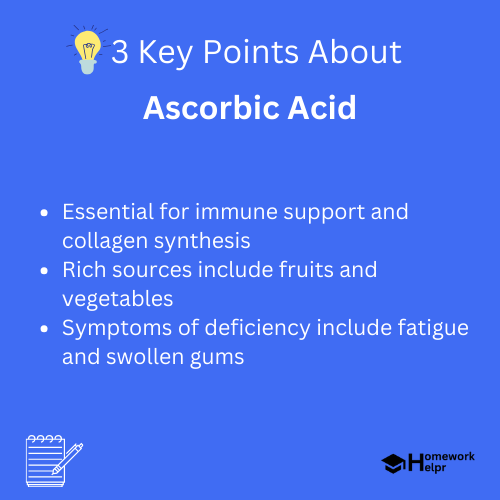📝 Summary
Ascorbic acid, known as Vitamin C, is an essential nutrient critical for maintaining health. As a water-soluble vitamin, it cannot be stored in the body, requiring regular intake. Vitamin C plays key roles, including collagen synthesis, acting as a strong antioxidant, and enhancing immune function. Functions vary with age, and deficiency can lead to scurvy, with notable symptoms including fatigue and swollen gums. Adequate consumption of fruits and vegetables, like citrus and berries, is vital for overall health and wellness, ensuring sufficient Vitamin C intake.}
Understanding Ascorbic Acid: The Essential Vitamin C
Ascorbic acid, commonly known as Vitamin C, is a vital nutrient that plays a significant role in maintaining health and wellness. It is a water-soluble vitamin, which means it can dissolve in water and is not stored in the body. Therefore, it’s essential to intake adequate amounts of this vitamin regularly. Ascorbic acid is important not just for its well-known benefits concerning the immune system, but also for various other body functions.
Definition
Water-soluble: Refers to substances that can dissolve in water, allowing them to enter the bloodstream and bodily fluids easily.
The Role of Ascorbic Acid in the Body
Ascorbic acid is involved in various crucial functions within the body. Here are some notable roles it plays:
- Collagen synthesis: It is vital for the production of collagen, a protein that helps maintain the structure of skin, blood vessels, bones, and cartilage.
- Antioxidant properties: It acts as a strong antioxidant that protects cells from damage caused by free radicals, which are harmful by-products of normal metabolism.
- Immune support: This vitamin helps enhance the function of the immune system by supporting various cellular functions of both the innate and adaptive immune systems.
❓Did You Know?
Did you know that the fruit with the highest concentration of ascorbic acid is the Kakadu plum? It contains up to 100 times more Vitamin C than an orange!
Sources of Ascorbic Acid
Ensuring a rich intake of ascorbic acid is essential. The good news is that ascorbic acid can be found in various foods, primarily fruits and vegetables. Some excellent sources include:
- Citrus fruits: Oranges, lemons, limes, and grapefruits are well-known sources.
- Berries: Strawberries, raspberries, and blueberries are packed with Vitamin C.
- Green leafy vegetables: Spinach, kale, and broccoli contribute significant amounts of ascorbic acid.
Including these foods in your daily diet not only satisfies your Vitamin C requirements but also provides various other essential nutrients and fibers, contributing to your overall wellness.
Examples
For instance, a medium-sized orange contains about 70 milligrams of ascorbic acid, which is more than the recommended daily allowance for adults.
The Importance of Ascorbic Acid for Different Age Groups
The requirement for ascorbic acid can vary across age groups. Here‚’ a brief look at how much Vitamin C different age categories need:
- Infants: 40-50 mg per day
- Children: 15-45 mg per day, depending on age
- Adults: 65-90 mg per day
Pregnant and breastfeeding women have higher needs, typically requiring around 85-120 mg per day to support both their health and their baby’s development.
Examples
For example, if an adult consumes a cup of strawberries (about 150 grams), they can receive approximately 85 milligrams of Vitamin C.
Symptoms of Ascorbic Acid Deficiency
Inadequate intake of ascorbic acid can lead to a deficiency known as scurvy. Scurvy manifests through various symptoms which might include:
- Fatigue and weakness
- Pain in the joints
- Swollen and bleeding gums
- Dry and rough skin
Scurvy is rare in developed nations due to the availability of Vitamin C-rich foods, but it can still occur, especially among individuals who have poor dietary habits.
Definition
Scurvy: A disease caused by a deficiency of Vitamin C, leading to symptoms such as weakness, anemia, and gum disease.
Health Benefits of Ascorbic Acid
Consuming sufficient ascorbic acid has numerous health benefits, making it an essential part of a healthy diet. Some of its significant health benefits include:
- Boosting Iron Absorption: Vitamin C enhances the absorption of non-heme iron (the type of iron found in plants), which is vital for preventing anemia.
- Reducing Chronic Disease Risks: Its antioxidant properties can lower the risk of chronic diseases, such as heart disease and stroke.
- Skin Health: By promoting collagen production, ascorbic acid can improve skin texture and promote healing.
❓Did You Know?
Interestingly, many animals can produce their own ascorbic acid, but humans and some primates must obtain it through their diet!
Supplementation and Recommended Intake
While it’s best to obtain ascorbic acid from food sources, sometimes supplementation is necessary, especially for those who may not eat a balanced diet. Here are some points to consider:
- Forms of supplementation: Vitamin C supplements come in various forms including capsules, effervescent tablets, and powders.
- Daily limits: High doses of supplements can lead to side effects such as stomach upset and diarrhea.
- Consulting a healthcare provider: Before starting any supplement, it’s advisable to consult a healthcare professional to determine your specific needs.
Conclusion
Ascorbic acid, or Vitamin C, is an indispensable nutrient crucial for various bodily functions. Its role in immune support, collagen synthesis, and overall health underscores the need for adequate intake through diet or supplementation. To maintain optimal health, remember to include a variety of fruits and vegetables in your meals. By being mindful of our dietary choices, we can harness the incredible benefits that ascorbic acid offers and pave the way for a healthier life.

Related Questions on Ascorbic Acid
What is ascorbic acid?
Answer: Ascorbic acid is Vitamin C, a vital nutrient.
Why is ascorbic acid important?
Answer: It supports immune function and collagen production.
What are common sources of ascorbic acid?
Answer: Citrus fruits and green leafy vegetables are excellent sources.
What can result from inadequate ascorbic acid intake?
Answer: It can lead to scurvy, causing fatigue and gum issues.
